28 May 2025
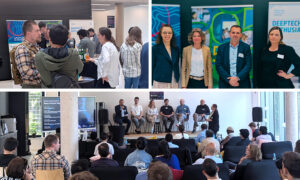
The 2025 edition of 'From Lab to Launch' brought together scientists and entrepreneurs at Start-up Labs Hamburg to explore funding pathways for science-based startups. Organised by EMBL, Hereon, DESY, and EMBLEM, the event featured keynote insights, a panel of experienced founders and funders, and…
CONNECTIONS
19 May 2025
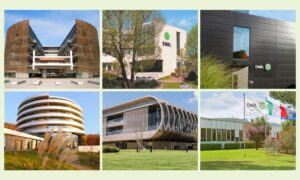
As Peer Bork and Ewan Birney take up interim leadership of EMBL, the organisation announces additional changes in site leadership.
EMBL ANNOUNCEMENTS
24 February 2025

Yehudi Bloch, ARISE Fellow at EMBL Hamburg, talks about the snow flea antifreeze protein. This is part of a series of stories about EMBL scientists and quirky, charming proteins that make them smile.
PEOPLE & PERSPECTIVES
3 February 2025

Yerba mate is a popular caffeinated beverage. Scientists mapped its genome, revealing surprising facts about its biochemistry and the evolution of caffeine biosynthesis. The findings might pave the way for new varieties of yerba mate.
SCIENCE & TECHNOLOGY
29 January 2025

Researchers from Mainz University and EMBL Hamburg have presented a new approach for assessing the form of disordered proteins by using anomalous X-ray scattering method for structural analysis.
SCIENCE & TECHNOLOGY
14 November 2024
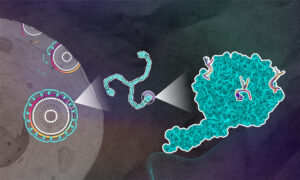
Scientists from EMBL Hamburg and CSSB have revealed key insights into the cellular process of clathrin-mediated endocytosis.
SCIENCE & TECHNOLOGY
11 November 2024
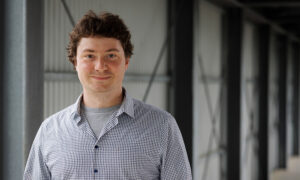
Jan Bláha, postdoc at EMBL Hamburg, talks about the utility of in cellulo protein crystallisation in structural biology research, his sources of inspiration, and the values of collaboration, curiosity, and resilience.
PEOPLE & PERSPECTIVES
15 October 2024
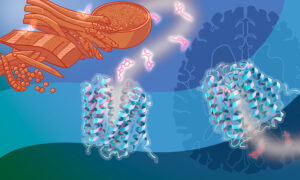
EMBL Hamburg scientists have gained molecular insights into how we absorb vitamin B1 – a mechanism with implications for disease and drug development.
SCIENCE & TECHNOLOGY
10 October 2024
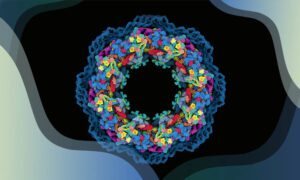
The function of biological molecules is intimately linked to their structure. In the 50 years since EMBL was established, its researchers and engineers have constantly provided leadership in structural biology research and services, resulting in many scientific breakthroughs and novel insights.
SCIENCE & TECHNOLOGY
9 October 2024
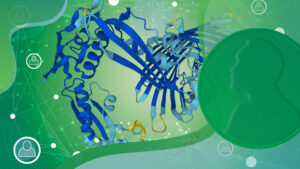
Creators of AI system AlphaFold receive 2024 Nobel Prize for Chemistry.
SCIENCE & TECHNOLOGY
2024
sciencescience-technology
25 July 2024

A major public engagement event at EMBL Hamburg attracted thousands. A video captures the spirit of the day from participants.
LAB MATTERS
4 July 2024

What makes EMBL unique? Among many things, it’s the infinite curiosity of its community.
LAB MATTERS
19 June 2024
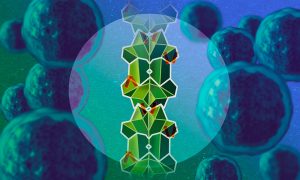
EMBL Hamburg scientists and collaborators discovered a new molecular mechanism in which an unstructured protein disables one of the main cancer-promoting proteins by gluing them into an elongated stack. Data from human patient samples support the role of this mechanism in prostate cancer…
SCIENCE & TECHNOLOGY
6 June 2024
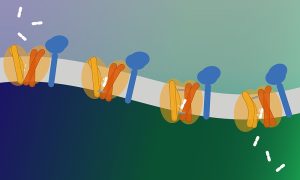
The group of Christian Löw at EMBL Hamburg and CSSB, and collaborators from the Christian-Albrechts-University Kiel and CNRS & Université Paris Cité worked together to reveal the structure and function of a previously unknown lysosome transporter, MFSD1.
SCIENCE & TECHNOLOGY
20 March 2024

Data standards that have been silently enabling discovery in the life sciences for decades are now making AI advances possible.
PEOPLE & PERSPECTIVES
2024
people-perspectivesperspectivesscience
21 December 2023
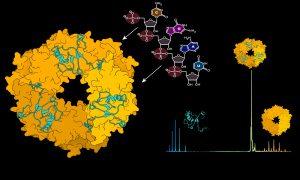
The Kosinski Group at EMBL Hamburg collaborated with other groups in Hamburg to reveal critical steps in Lassa virus ribonucleoparticle assembly and recruitment, and the crucial role played by RNA in in the Lassa virus life cycle.
SCIENCE & TECHNOLOGY
2023
sciencescience-technology
19 December 2023
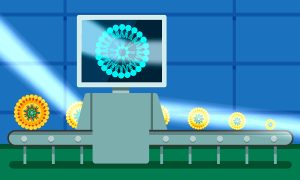
EMBL Hamburg, Johannes Gutenberg University Mainz, Postnova Analytics GmbH, and BioNTech SE have developed a new method to quantitatively investigate sizes of nanoparticles containing mRNA. It may become an important part of regular characterisation of mRNA nanomedicines in the future.
SCIENCE & TECHNOLOGY
2023
sciencescience-technology
14 December 2023
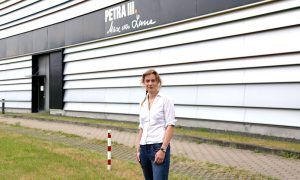
EMBL Hamburg is located at the PETRA III synchrotron, which in the future, will be upgraded to PETRA IV. Selina Storm is theEMBL@PETRA IV Programme Manager. Here, she speaks about her role and the benefits of PETRA IV for EMBL.
LAB MATTERSPEOPLE & PERSPECTIVES
2023
lab-matterspeople-perspectives
27 November 2023
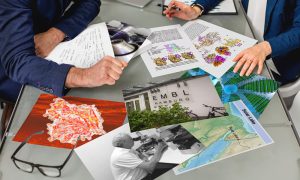
An interdisciplinary collaboration between Hamburg scientists has yielded new insights into the structure and function of a heat-resistant enzyme from an exotic microbe. In this interview, EMBL Hamburg’s Matthias Wilmanns and TUHH’s Garo Antranikian discuss how their collaboration developed and…
SCIENCE & TECHNOLOGY
2023
sciencescience-technology
15 November 2023
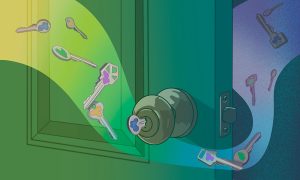
Promiscuity is critical for nourishment. How? This question lies at the focus of research by the Löw Group at EMBL Hamburg. Using structural biology methods, they explore how specialised molecules located in the cell membrane allow cells absorb nutrients from their environment.
EMBLetc
1 November 2023
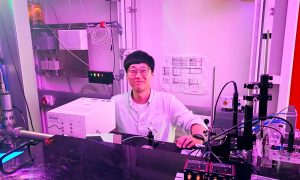
In this interview, Sihyun Sung, Postdoctoral Fellow at EMBL Hamburg, talks about making molecular movies with time-resolved serial X-ray crystallography, his sources of inspiration, and the value of forging deeper connections with friends and colleagues.
LAB MATTERSPEOPLE & PERSPECTIVES
2023
lab-matterspeople-perspectives
26 October 2023

Jan Kosinski, Julia Mahamid, and Georg Zeller have received grants to enable ambitious projects aimed at mapping the cellular protein synthesis machinery in context and understanding complex host-microbiome interactions, respectively.
EMBL ANNOUNCEMENTS
2023
embl-announcementsscience
2 October 2023
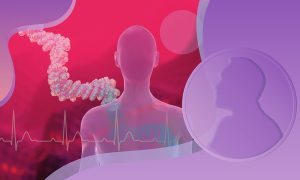
Pioneers of the mRNA nanomedicines technology receive 2023 Nobel Prize in Physiology or medicine. EMBL is pleased to have supported the development of the application of the mRNA nanomedicine technology through our long-standing collaboration with BioNTech, Johannes Gutenberg University Mainz and…
SCIENCE & TECHNOLOGY
2023
sciencescience-technology
6 September 2023
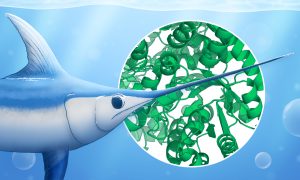
Learn how scientists use bio-SAXS, an experimental X-ray technique, to study the shape and dynamics of proteins and other biomolecules. SAXS can be even used to analyse the structure of mineral particles in the swordfish sword bone, which can help scientists better understand bone ageing.
SCIENCE & TECHNOLOGY
2023
sciencescience-technology
8 August 2023
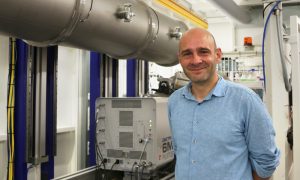
Clément Blanchet has been appointed to lead the team working on small-angle X-ray scattering (SAXS) at EMBL Hamburg. In this interview, he talks his ambitions for the future work of the SAXS Team, his passion for science, and a memorable ‘aha’ moment he had in his early career.
LAB MATTERSPEOPLE & PERSPECTIVES
2023
lab-matterspeople-perspectives
3 July 2023
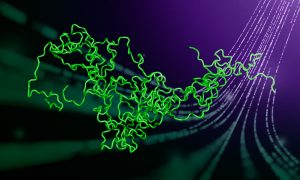
A third of all known proteins are either completely or partially unstructured. EMBL scientists contributed to a new set of guidelines – Minimum Information About a Disorder Experiment (MIADE) – that will help researchers share data on unstructured proteins in a more useful way and will enable…
SCIENCE & TECHNOLOGY
2023
sciencescience-technology
31 May 2023
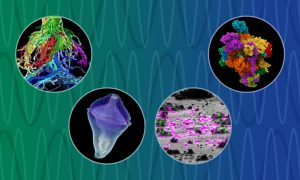
EMBL researchers and collaborators have begun an impactful innovation-development journey, thanks to a European Commission ‘IMAGINE’ grant.
CONNECTIONSLAB MATTERS
2023
connectionslab-matters
10 May 2023

EMBL Hamburg scientists have contributed to the development of the Spitrobot, a ground-breaking experimental setup that will simplify creating molecular movies. The Spitrobot automates the sample preparation for time-resolved crystallography, which is used to create 3D snapshots of protein…
SCIENCE & TECHNOLOGY
2023
sciencescience-technology
20 April 2023
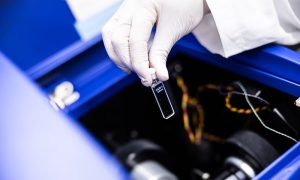
EMBL Hamburg partners with the Hanseatic Life Science Research Infrastructure Consortium (HALRIC) to enhance life sciences research in Scandinavia and northern Germany. The consortium builds on the HALOS project to foster collaborations between industry, hospitals, and universities, leveraging…
CONNECTIONSLAB MATTERS
2023
connectionslab-matters
12 April 2023
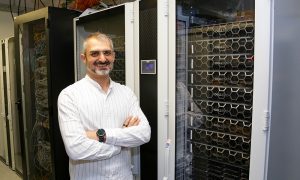
Eduard Avetisyan leads the EMBL Hamburg IT team. He joined EMBL after transitioning from particle physics research to IT. Besides providing standard IT user support, his team also enables smooth processing and computational analysis of structural biology data. Here, he talks about the joys and…
LAB MATTERSPEOPLE & PERSPECTIVES
2023
lab-matterspeople-perspectives
17 March 2023
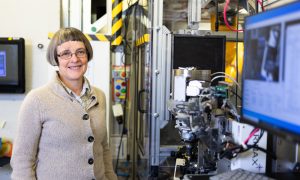
Biological X-ray imaging is an emerging technology that uses X-rays to image tissues or even entire organisms. It will play an important role in EMBL Hamburg’s future service portfolio, and will allow studying life on multiple scales. Team Leader Liz Duke discusses her plans to establish X-ray…
LAB MATTERSPEOPLE & PERSPECTIVES
2023
lab-matterspeople-perspectives
1 March 2023
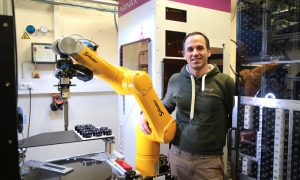
Physicists, engineers and robotics experts work together in EMBL Hamburg’s Instrumentation Team to design instruments that support structural biology research. The team has finished a transfer robot that facilitates automated handling of protein crystals with care and precision. This will help…
LAB MATTERSSCIENCE & TECHNOLOGY
2023
lab-mattersscience-technology
15 February 2023
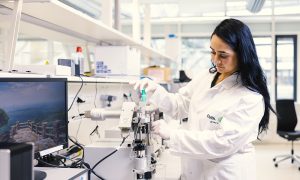
EMBL Hamburg’s Sample Preparation and Characterisation (SPC) Facility offers scientists access to almost all available biophysics technologies. The facility’s staff provides advice and support with experiments and data analysis. The facility is conveniently located just next to the EMBL…
LAB MATTERSSCIENCE & TECHNOLOGY
2023
lab-mattersscience-technology
31 January 2023

EMBL Rome group leader Jamie Hackett receives EUR 2 million for the ModLogic project, aimed at understanding how chromatin modifications impact gene activity.
EMBL ANNOUNCEMENTSLAB MATTERS
2023
embl-announcementslab-matters
16 November 2022
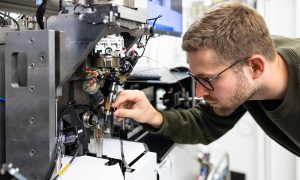
Kirill Kovalev, an EMBL Hamburg researcher, is studying the structure of an ancient bacterial molecule to help scientists control brain cell activity
EMBLetc
21 September 2022
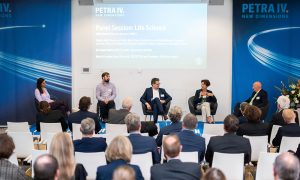
EMBL joined a kick-off event focusing on the developments related to the upgrade of the PETRA III synchrotron storage ring to PETRA IV at the DESY campus, where EMBL Hamburg is located. PETRA IV could open new possibilities at EMBL Hamburg, contributing to the goals of the EMBL Programme…
LAB MATTERSSCIENCE & TECHNOLOGY
2022
lab-mattersscience-technology
22 July 2022

Jan Kosinski, Group Leader at EMBL Hamburg and one of the co-chairs of the Infection Biology theme in EMBL’s new programme, chats about how this theme will support his work and help establish new collaborations.
LAB MATTERSPEOPLE & PERSPECTIVES
2022
lab-matterspeople-perspectives
10 June 2022
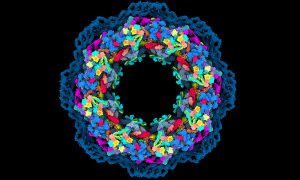
Scientists have solved several mysteries around the structure and function of a true molecular giant: the human nuclear pore complex. They created the most complete model of the complex thanks to combining the program AlphaFold2 with cryo-electron tomography, integrative modelling, molecular…
SCIENCE & TECHNOLOGY
2022
sciencescience-technology
18 May 2022
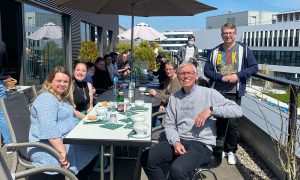
Students from the Business Academy Aarhus visit EMBL Hamburg annually. Many of them return later as trainees to gain experience as lab technicians. EMBL Hamburg offers great opportunities to learn diverse techniques and work with various equipment. This experience helps them in their future jobs in…
LAB MATTERS
1 February 2022

EMBL Hamburg’s Grzegorz Chojnowski from the Wilmanns Group developed software called findMySequence, which identifies proteins’ amino-acid sequences based on electron cryo-microscopy and X-ray crystallography data. It’s useful for identifying unknown proteins in samples from natural sources.
SCIENCE & TECHNOLOGY
2022
sciencescience-technology
21 December 2021
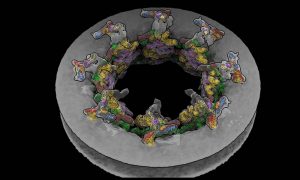
EMBL Hamburg’s Kosinski Group, the Beck Laboratory at the Max Planck Institute of Biophysics, and colleagues at EMBL Heidelberg recorded the nuclear pore complex contracting in living cells. They visualised the movement with an unprecedented level of detail with help of new software called…
SCIENCE & TECHNOLOGY
2021
sciencescience-technology
7 December 2021

RNA vaccines, such as the ones for COVID-19, represent a new approach in vaccine technology. Cy Jeffries, faculty staff scientist at EMBL Hamburg, explains the clever technology behind RNA vaccines, and how structural biology contributes to its development. EMBL Hamburg collaborated on several…
SCIENCE & TECHNOLOGY
2021
sciencescience-technology
8 November 2021
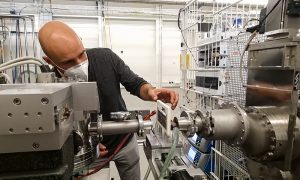
Each year, EMBL Hamburg’s Svergun Group offers practical EMBO courses and lecture courses on biological small-angle X-ray scattering (SAXS). The courses provide young scientists an opportunity to gain hands-on experience by measuring their own samples, and by exploring different aspects of SAXS…
LAB MATTERSSCIENCE & TECHNOLOGY
2021
lab-mattersscience-technology
5 November 2021

Ken Holmes, outstanding pioneer of structural biology and founder of EMBL´s Hamburg site, died on 2 November 2021 at the age of 87.
PEOPLE & PERSPECTIVES
2021
alumnipeople-perspectives
5 November 2021
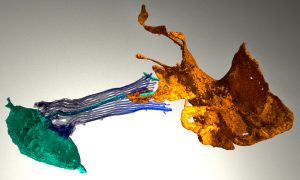
What can sponges tell us about the evolution of the brain? Sponges have the genes involved in neuronal function in higher animals. But if sponges don’t have brains, what is the role of these? EMBL scientists imaged the sponge digestive chamber to find out.
SCIENCE & TECHNOLOGY
2021
sciencescience-technology
3 November 2021
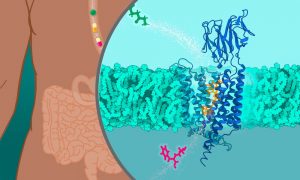
Scientists at EMBL Hamburg determined the molecular structure of Peptide Transporters 1 and 2. The findings will enable developing drugs that more efficiently pass from the gut to target tissues.
SCIENCE & TECHNOLOGY
2021
sciencescience-technology
25 October 2021
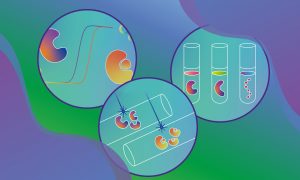
EMBL Hamburg’s Sample Preparation and Characterisation (SPC) Facility has released eSPC, an online platform for analysing data from biophysical experiments. The platform enables the scientific community to analyse data from different experiments without the need to travel.
SCIENCE & TECHNOLOGY
2021
sciencescience-technology
15 October 2021
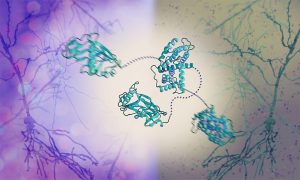
The Graham and Crump groups at the University of Cambridge and the Svergun Group at EMBL Hamburg have discovered a mechanism by which the herpes simplex virus takes control of the molecular machinery of human cells. Their work reveals how a dedicated viral protein hijacks key host proteins, forcing…
SCIENCE & TECHNOLOGY
2021
sciencescience-technology
6 October 2021
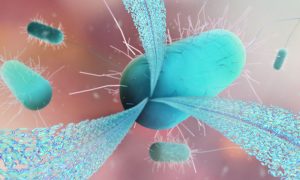
Structural biology provides insights into the diverse functions of fibrous protein in humans, amphibians, and bacteria.
SCIENCE & TECHNOLOGY
2021
sciencescience-technology
20 August 2021
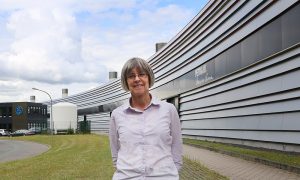
The new team leader at EMBL Hamburg talks about her plans to establish biological X-ray imaging and high-throughput tomography.
LAB MATTERSPEOPLE & PERSPECTIVES
2021
lab-matterspeople-perspectives
27 July 2021
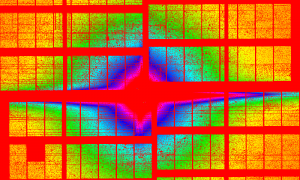
A collaboration led by EMBL Hamburg’s Svergun Group used small-angle X-ray scattering (SAXS) at the European XFEL to obtain data on samples containing coronavirus spike proteins and antibodies that bind them.
SCIENCE & TECHNOLOGY
2021
sciencescience-technology
13 July 2021

EMBL alumni Ilaria Piazza and Ken Holmes have been recognised for their outstanding contributions, and will receive their awards as part of the celebrations for EMBL World Alumni Day.
PEOPLE & PERSPECTIVES
2021
alumnipeople-perspectives
12 July 2021
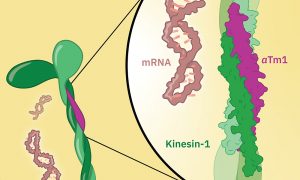
EMBL scientists generate a high-resolution crystal structure of the Kinesin-1/aTm1 transport complex in the fruit fly.
SCIENCE & TECHNOLOGY
2021
sciencescience-technology
9 July 2021
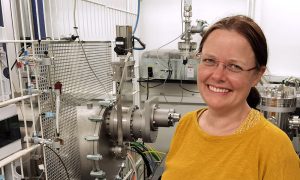
EMBL’s Melissa Graewert and colleagues are taking a structural biologist’s approach to better understanding nanoplastic particles.
SCIENCE & TECHNOLOGY
2021
sciencescience-technology
25 June 2021
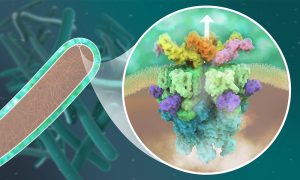
EMBL Hamburg’s Wilmanns and Kosinski groups have determined the detailed structure of a bacterial protein complex critical for tuberculosis infection.
SCIENCE & TECHNOLOGY
2021
sciencescience-technology
8 June 2021
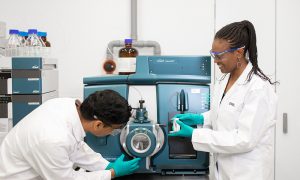
EMBL is conducting an Impact Assessment of our experimental services to understand the value these services have for our external user community. If you have accessed EMBL experimental services at one or more of our facilities to support the conduct of your research, we would like to hear from you.
LAB MATTERS
4 June 2021

EMBL Director Matthias Hentze describes the Environmental Research Initiative: a community effort to solve global environmental challenges.
LAB MATTERSPEOPLE & PERSPECTIVES
2021
lab-matterspeople-perspectives
21 May 2021
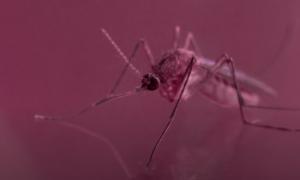
EMBL scientists support research on malaria by providing freely available data resources and using innovative experimental approaches. Our Course and Conference Office facilitates the exchange of knowledge in the field by hosting the annual BioMalPar conference.
SCIENCE & TECHNOLOGY
2021
sciencescience-technology
17 May 2021
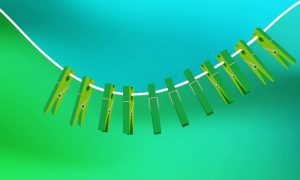
Researchers at EMBL Hamburg reveal how peg-like proteins clasp and reshape the cell membrane
SCIENCE & TECHNOLOGY
2021
sciencescience-technology
12 May 2021
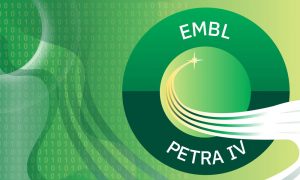
A workshop run by EMBL Hamburg explored opportunities for structural biology at the future, upgraded PETRA IV synchrotron.
SCIENCE & TECHNOLOGY
2021
eventsscience-technology
29 April 2021
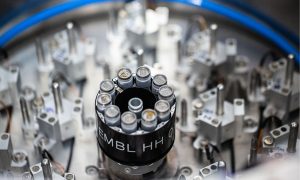
EMBL Hamburg’s integrated structural biology facility has contributed to the success of a large-scale SARS-CoV-2 study
SCIENCE & TECHNOLOGY
2021
sciencescience-technology
9 April 2021
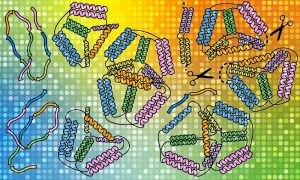
Using EMBL Hamburg’s world-class structural biology infrastructure, researchers advance the folding of protein ‘origami’ designed in the lab.
SCIENCE & TECHNOLOGY
2021
sciencescience-technology
6 April 2021
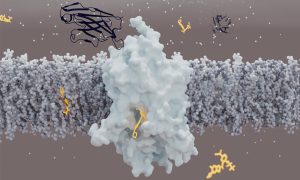
Scientists have determined the structure of Glycine Transporter 1. The finding could open new avenues for developing therapeutics for psychiatric disorders
SCIENCE & TECHNOLOGY
2021
sciencescience-technology
30 March 2021
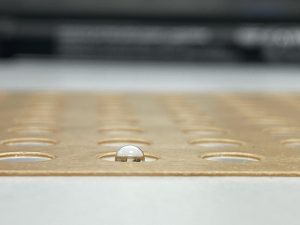
Scientists at EMBL Hamburg use droplets of protein solution to grow protein crystals. By exposing the crystals to X-rays, they are able to determine the protein’s molecular structure.
SCIENCE & TECHNOLOGY
2021
picture-of-the-weekscience-technology
22 February 2021
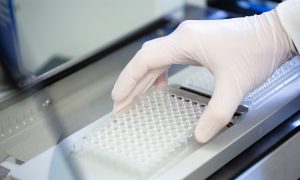
The Sample Preparation and Characterisation (SPC) Facility at EMBL Hamburg is one of the founding members of the Molecular-Scale Biophysics Research Infrastructure (MOSBRI). Within this new European initiative, the SPC Facility will offer services related to membrane proteins, protein complexes,…
CONNECTIONSLAB MATTERS
2021
connectionslab-matters
26 January 2021
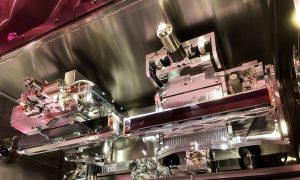
Engineers at EMBL Hamburg installed specially designed mirrors to reflect and focus X-ray beams onto tiny crystals made of proteins or other biological molecules.
SCIENCE & TECHNOLOGY
2021
picture-of-the-weekscience-technology
14 January 2021
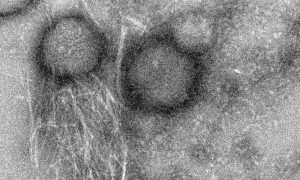
Researchers at the Technion – Israel Institute of Technology and EMBL Hamburg, in collaboration with scientists in Israel and Spain, have discovered remarkable molecular properties of an antimicrobial peptide from the skin of the Australian toadlet. The discovery could inspire the development of…
SCIENCE & TECHNOLOGY
2021
sciencescience-technology
12 January 2021
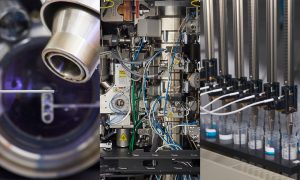
EMBL’s sites in Grenoble, Hamburg, and Heidelberg form the newest Instruct Centre. The new centre offers users access to a broad range of state-of-the-art facilities.
CONNECTIONSLAB MATTERS
2021
connectionslab-matters
12 January 2021
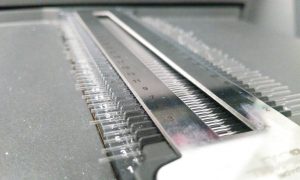
Structural biologists want to study proteins at the atomic level. The device shown in this Picture of the Week is essential for this.
SCIENCE & TECHNOLOGY
2021
picture-of-the-weekscience-technology
1 December 2020
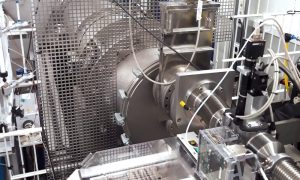
Biotechnology company BioNTech and Johannes Gutenberg University Mainz conduct collaborative research with EMBL scientists at the beamline P12 in Hamburg
SCIENCE & TECHNOLOGY
2020
sciencescience-technology
1 December 2020

Hamburg hosts one of EMBL’s six sites. The city is notorious for its windy and rainy weather. Lots of rain also means a high chance of beautiful rainbows!
LAB MATTERS
2020
lab-matterspicture-of-the-week
4 November 2020
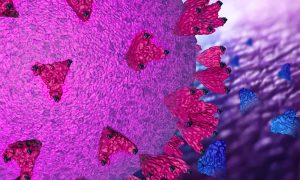
By screening hundreds of sybodies (synthetic mini-antibodies), scientists have identified one that might stop SARS-CoV-2 from infecting human cells. This work, which holds promise for treating COVID-19, was conducted by EMBL Hamburg and collaborators from the Centre for Structural Systems Biology…
SCIENCE & TECHNOLOGY
2020
sciencescience-technology
16 October 2020
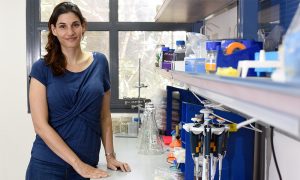
New associate group leader at EMBL Hamburg investigates the structure of functional amyloids in bacteria and in human disease
LAB MATTERSPEOPLE & PERSPECTIVES
2020
lab-matterspeople-perspectives
13 October 2020
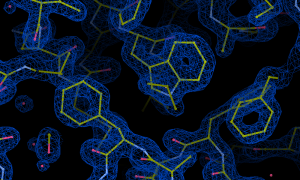
A group of scientists led by EMBL Hamburg’s Christian Löw provide insights into the molecular structure of proteins involved in the gliding movements through which the parasites causing malaria and toxoplasmosis invade human cells.
SCIENCE & TECHNOLOGY
2020
sciencescience-technology
3 September 2020
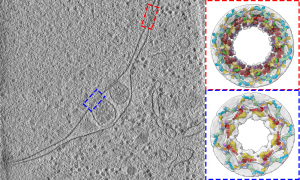
Scientists from the Beck group have studied the 3D structure of nuclear pores in budding yeast. They show how the architecture of the nuclear pore complex differs inside cells compared to its form observed in vitro studies.
SCIENCE & TECHNOLOGY
2020
sciencescience-technology
18 August 2020
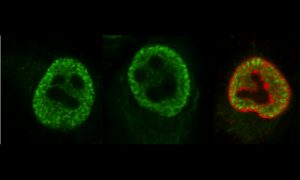
Despite their ghostly appearance, these are very real cell nuclei infected with Influenza A virus – the only influenza virus known to cause pandemics.
SCIENCE & TECHNOLOGY
2020
picture-of-the-weekscience-technology
29 July 2020
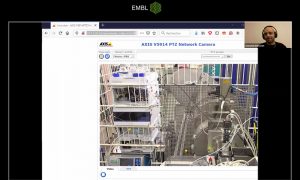
The Svergun group at EMBL Hamburg has released the course ‘Solution Scattering from Biological Macromolecules’ in an online format for the first time. The course explores different aspects of small-angle X-ray scattering (SAXS) for studying the structure of macromolecules.
EMBL ANNOUNCEMENTS
2020
embl-announcementsevents
9 June 2020
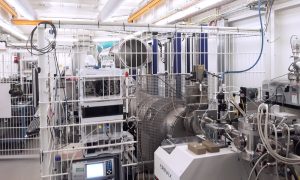
EMBL researchers are studying COVID-19-related molecules by exposing them to high-brilliance X-ray beams. The Svergun group at EMBL Hamburg is using biological small-angle X-ray scattering (SAXS) as part of a global effort by scientists to elucidate the structural organisation of SARS-CoV-2…
SCIENCE & TECHNOLOGY
2020
sciencescience-technology
11 May 2020
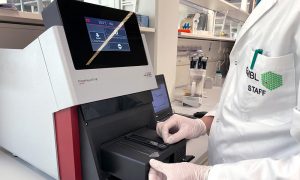
The Sample Preparation and Characterisation Facility (SPC) at EMBL Hamburg reopens to support scientists working on Covid-19 research. The SPC Facility is one of the best equipped facilities in Europe is therefore in high demand from external users. Re-opening the facility also allows experts at…
SCIENCE & TECHNOLOGY
2020
sciencescience-technology
28 April 2020
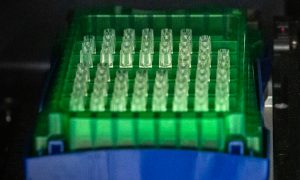
Scientists at EMBL Hamburg and Karolinska Institutet Stockholm aim to find synthetic antibodies – known as nanobodies – that bind a surface protein of the novel SARS-CoV-2 coronavirus. Nanobodies could prevent the virus from entering human cells and causing COVID-19.
SCIENCE & TECHNOLOGY
2020
sciencescience-technology
7 April 2020
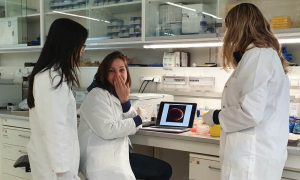
EMBL is all about exciting science, through which we aim to achieve a fundamental understanding of biological processes.
SCIENCE & TECHNOLOGY
2020
picture-of-the-weekscience-technology
28 January 2020
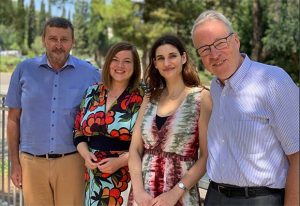
Strengthening ties between EMBL and Israel through the Scientific Visitor Programme
PEOPLE & PERSPECTIVES
2020
people-perspectivesscience
19 December 2019
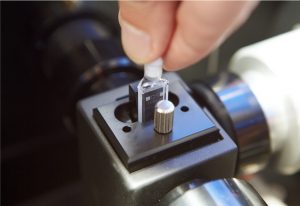
EU funding for iNEXT-Discovery consortium unlocks key technologies for structural biology
EMBL ANNOUNCEMENTSLAB MATTERS
2019
embl-announcementslab-matters
6 December 2019
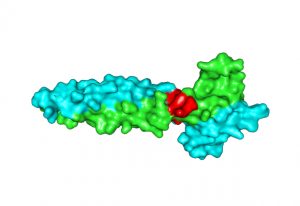
A new paper describes a unique mechanism of partner selectivity in transcription factors.
SCIENCE & TECHNOLOGY
2019
sciencescience-technology
17 September 2019
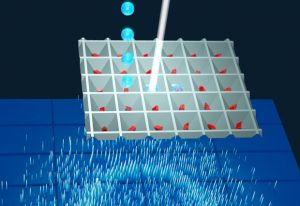
Researchers from Hamburg simplify time-resolved X-ray crystallography
SCIENCE & TECHNOLOGY
2019
sciencescience-technology
2 August 2019
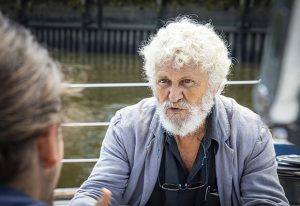
Eric Karsenti's combined loves of biology and sailing set in motion the Tara Oceans expedition
PEOPLE & PERSPECTIVES
2019
people-perspectivesscience
18 July 2019
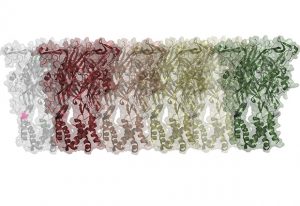
EMBL scientists collaborate to develop new protocol for screening membrane protein stability
SCIENCE & TECHNOLOGY
2019
sciencescience-technology
11 July 2019
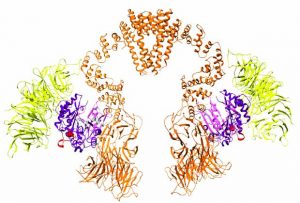
Using cryo-EM, scientists have determined the structure of a large protein complex called Elongator.
SCIENCE & TECHNOLOGY
2019
sciencescience-technology
28 June 2019
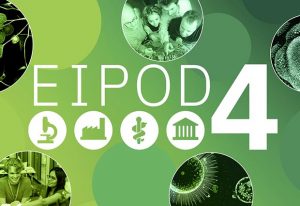
EIPOD4 will prepare researchers for the increasing interdisciplinarity of scientific career paths
EMBL ANNOUNCEMENTSLAB MATTERS
2019
embl-announcementslab-matters
21 June 2019

Tara schooner welcomes on board journalists, policymakers, funders and scientists
EMBL ANNOUNCEMENTS
2019
embl-announcementsevents
17 June 2019

EMBL Hamburg and Tara raise awareness of the risks of microplastic pollution and global infection
EMBL ANNOUNCEMENTS
2019
embl-announcementsevents
7 June 2019

Overwhelmed as a biologist getting to grips with computer programming? EMBLers are here to help!
LAB MATTERS
4 June 2019
When: Monday 17 June at 10:30Where: The press conference will be held on the Tara schooner at the Sandtorhafen in the Hamburg harbourWhat: A press conference on the new Tara mission on microplastics and Tara’s cooperation with EMBL. A tour of the schooner will be organised with the…
EMBL ANNOUNCEMENTS
2019
embl-announcementsevents
31 May 2019
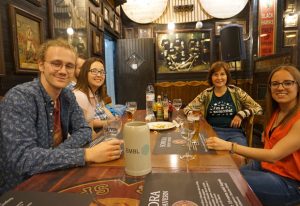
EMBL got together with the global science festival Pint of Science to explain and celebrate science.
LAB MATTERS
18 February 2019
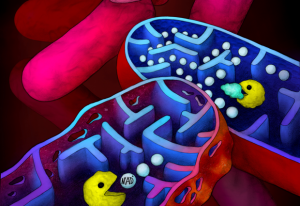
Suicide system in tuberculosis bacteria might hold key to treatment
SCIENCE & TECHNOLOGY
2019
sciencescience-technology
1 February 2019
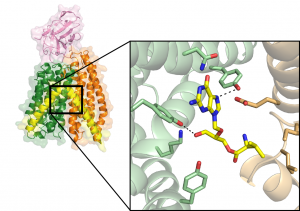
Scientists develop structural model that could help in the development of drugs with increased absorption rates
SCIENCE & TECHNOLOGY
2019
sciencescience-technology
2 January 2019
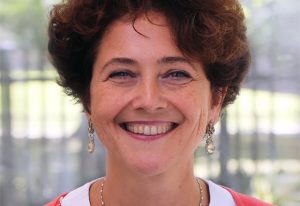
On January 1 2019, Edith Heard takes up the position of EMBL’s Director General
LAB MATTERSPEOPLE & PERSPECTIVES
2019
lab-matterspeople-perspectives
7 November 2018
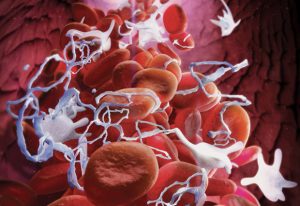
EMBL scientists investigate the structure of a key protein involved in blood clotting
SCIENCE & TECHNOLOGY
2018
sciencescience-technology
31 October 2018
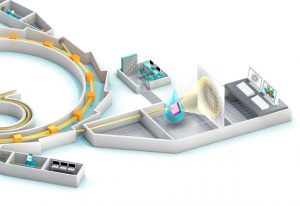
Speeding up time-resolved X-ray crystallography with EMBL beamline P14
SCIENCE & TECHNOLOGY
2018
sciencescience-technology
22 October 2018
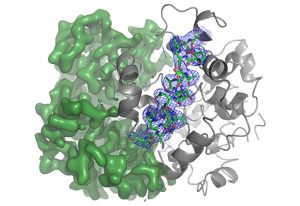
Researchers at EMBL Hamburg have released the next generation of their ARP/wARP software
LAB MATTERSSCIENCE & TECHNOLOGY
2018
lab-mattersscience-technology
19 October 2018
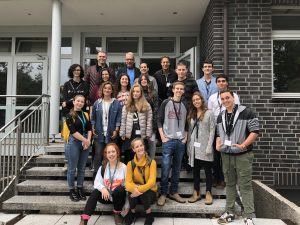
17 young scientists experienced hands-on training at EMBL Hamburg.
CONNECTIONS
13 September 2018
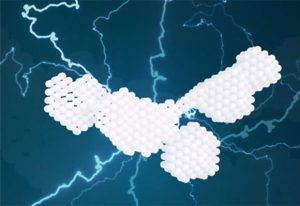
X-ray experiments show that scaffolding protein PDZK1 has a L-shaped conformation
SCIENCE & TECHNOLOGY
2018
sciencescience-technology
2 August 2018

Discover how EMBLers across all sites share their passion for science
LAB MATTERSPEOPLE & PERSPECTIVES
2018
lab-matterspeople-perspectives
1 June 2018
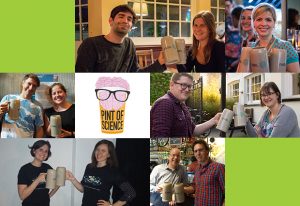
EMBL and Pint of Science join forces to entertain and educate
LAB MATTERS
29 May 2018
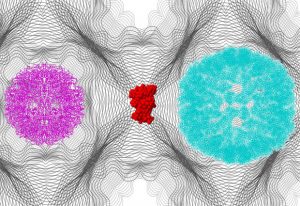
Scientists at EMBL Hamburg determine shapes of intermediate states in dynamic biological systems
SCIENCE & TECHNOLOGY
2018
sciencescience-technology
21 March 2018
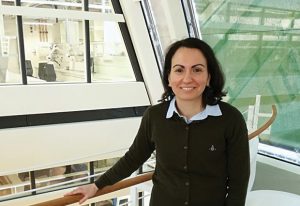
The new head of facility at EMBL Hamburg will help users solve protein puzzles
PEOPLE & PERSPECTIVES
2018
people-perspectivesscience
8 March 2018
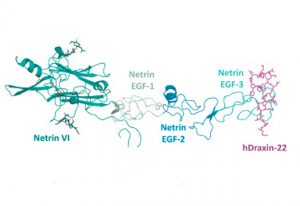
EMBL scientists discover how two guidance cues work together when neurons project axons across the midline
SCIENCE & TECHNOLOGY
2018
sciencescience-technology
21 December 2017

A look back at some of the most read stories on EMBL’s news website this year
LAB MATTERS
29 November 2017
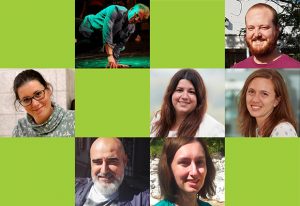
EMBLers across all sites share how their curiosity about the world shapes their everyday life
LAB MATTERS
22 November 2017

20,000 visitors get sneak peek at giant particle accelerators at DESY DAY in Hamburg
LAB MATTERS
14 November 2017
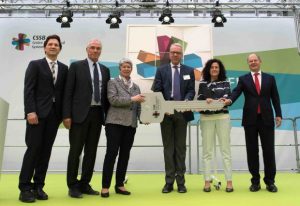
Inside the Centre for Structural Systems Biology
SCIENCE & TECHNOLOGY
2017
sciencescience-technology
3 October 2017
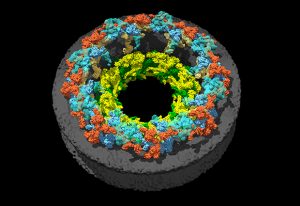
EMBL’s new group leader based in Hamburg aims to create models of infection cycles
PEOPLE & PERSPECTIVES
2017
people-perspectivesscience
1 September 2017
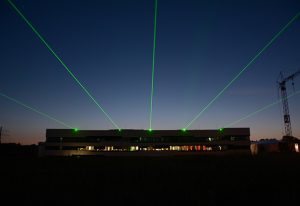
Newly opened European X-Ray Free-Electron Laser celebrates start of user operations
CONNECTIONS
6 July 2017
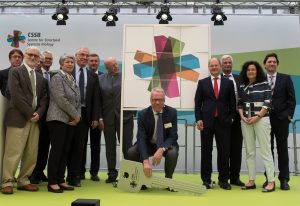
On 29 June, at a ceremony in front of 700 guests, the Centre for Structural Systems Biology (CSSB) in Hamburg, was officially opened. At the event on the Deutsches Elektronen-Synchrotron (DESY) Campus in Hamburg, Helmut Dosch, Chairman of the DESY Board of Directors, presented Head of EMBL Hamburg…
CONNECTIONSLAB MATTERS
2017
connectionslab-matters
11 April 2017
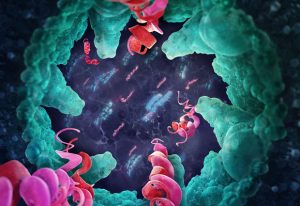
EMBL scientists add crucial knowledge to understanding of the bacterium that causes tuberculosis
SCIENCE & TECHNOLOGY
2017
sciencescience-technology
28 February 2017

EMBL alumna Zehra Sayers key driver of the Middle East’s first synchrotron project
PEOPLE & PERSPECTIVES
2017
alumnipeople-perspectives
8 December 2016
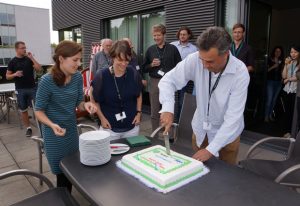
The PEPC course celebrated its 10th anniversary in Hamburg from the 12 – 20 September this year
CONNECTIONS
2 December 2016

How Christian Löw’s failed experiment led to an unexpected scientific journey
SCIENCE & TECHNOLOGY
2016
sciencescience-technology
6 October 2016

Rosemary Wilson talks about imposter syndrome and how to handle it
LAB MATTERSPEOPLE & PERSPECTIVES
2016
lab-matterspeople-perspectives
30 August 2016

Collaborating to take crystallography into a new time dimension
SCIENCE & TECHNOLOGY
2016
sciencescience-technology
30 August 2016

Turning the spotlight on the diverse universe of EMBL’s 200-strong postdoc community
LAB MATTERSPEOPLE & PERSPECTIVES
2016
lab-matterspeople-perspectives
30 August 2016
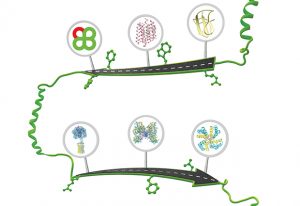
'The PDB plays a crucial role in structural biology research and development'
SCIENCE & TECHNOLOGY
2016
sciencescience-technology
8 August 2016
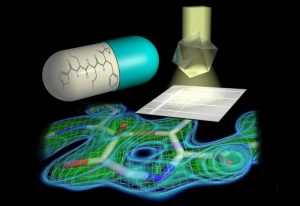
Detailed structure paves the way for more effective cancer therapies
SCIENCE & TECHNOLOGY
2016
sciencescience-technology
14 June 2016
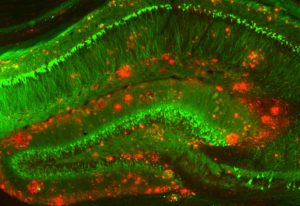
How cells eliminate protein deposits that can lead to neurodegenerative disorders
SCIENCE & TECHNOLOGY
2016
sciencescience-technology
13 June 2016
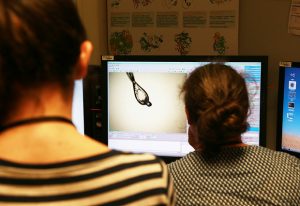
Establishing a programme of research, development and user services for time-resolved crystallography
SCIENCE & TECHNOLOGY
2016
sciencescience-technology
10 May 2016
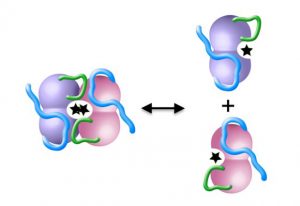
Unexpected results: structure of DAPK enzyme reveals dual-purpose loop
SCIENCE & TECHNOLOGY
2016
sciencescience-technology
21 April 2016
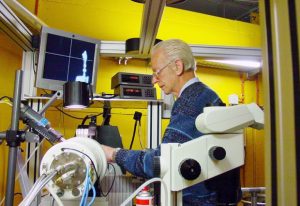
Meet a driving force behind collaborations with the Slovak Republic, alumnus Jozef Ševčik
PEOPLE & PERSPECTIVES
2016
alumnipeople-perspectives
24 March 2016
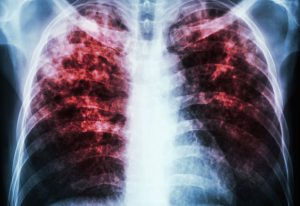
How an EMBL team is making and sharing tools to explore tuberculosis protein structures
SCIENCE & TECHNOLOGY
2016
sciencescience-technology
4 February 2016
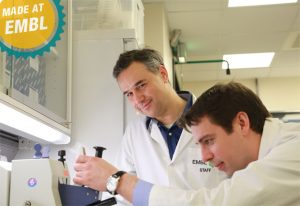
Protein screens developed at EMBL Hamburg now commercially available
SCIENCE & TECHNOLOGY
2016
sciencescience-technology
18 January 2016
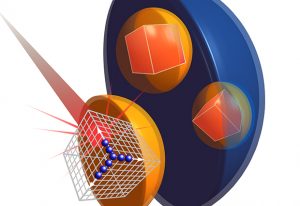
Hamburg collaborators analyse protein crystals inside the cells that made them.
SCIENCE & TECHNOLOGY
2016
sciencescience-technology
15 January 2016
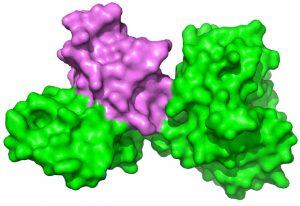
Further insights into how viral enzymes degrade the cell walls of Clostridia bacteria.
SCIENCE & TECHNOLOGY
2016
sciencescience-technology
17 December 2015
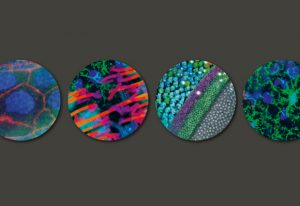
With 28 conferences and 57 courses, 2016 will be EMBL’s most eventful year to date.
CONNECTIONS
25 November 2015

Compelling short stories that shine light on the life and work of EMBL staff.
LAB MATTERSPEOPLE & PERSPECTIVES
2015
lab-matterspeople-perspectives
24 November 2015
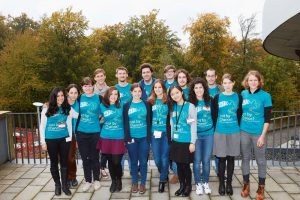
A snapshot of the many activities and events that took place in the world of EMBL this Autumn.
LAB MATTERS
23 November 2015
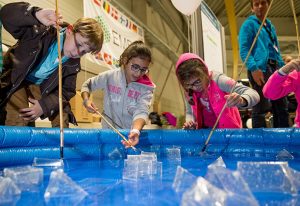
Energy, enthusiasm and endurance on tap as thousands attend 12-hour Hamburg Night of Science.
LAB MATTERS
26 October 2015
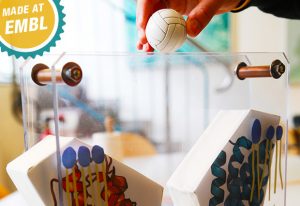
Hamburg researchers have a ball creating game to explain transporter protein mechanism.
LAB MATTERS
14 September 2015
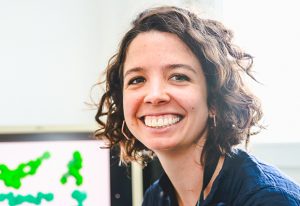
Introducing the Small Angle Scattering Biological Data Bank, developed at EMBL Hamburg.
LAB MATTERSSCIENCE & TECHNOLOGY
2015
lab-mattersscience-technology
13 July 2015
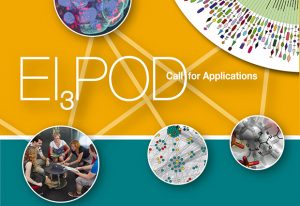
EI3POD: flagship interdisciplinary postdoc programme opens its doors to academia and industry.
EMBL ANNOUNCEMENTSLAB MATTERS
2015
embl-announcementslab-matters
2 July 2015
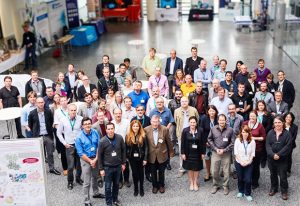
Industrial partners and BioStruct-X facility members gather for Workshop at EMBL Hamburg.
CONNECTIONS
18 June 2015

A puzzling peculiarity resolved by Hamburg’s Sample Preparation and Characterisation facility.
SCIENCE & TECHNOLOGY
2015
sciencescience-technology
15 June 2015

EMBL’s new open access policy aims to make EMBL research widely and freely accessible.
LAB MATTERS
29 April 2015

Q&A: Which analogy best describes your research?
LAB MATTERS
6 April 2015
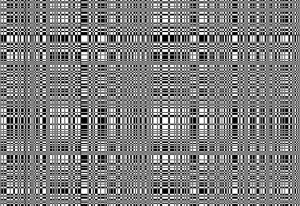
Coin toss inspires CorMap: a new statistical test that sidesteps need for error estimation.
SCIENCE & TECHNOLOGY
2015
sciencescience-technology
20 February 2015
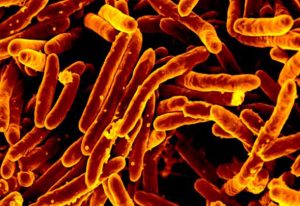
Hamburg-led tuberculosis study demonstrates the power of collaboration.
SCIENCE & TECHNOLOGY
2015
sciencescience-technology
26 January 2015
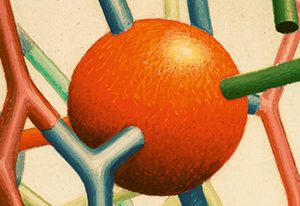
As EMBL Hamburg celebrates 40 years, we explore the past, present and future of crystallography.
SCIENCE & TECHNOLOGY
2015
sciencescience-technology
26 January 2015
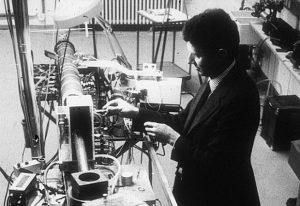
Ken Holmes, one of the visionaries behind EMBL and EMBL Hamburg, looks back to where it all began.
LAB MATTERS
11 December 2014
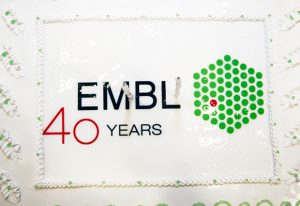
EMBL Hamburg celebrates four decades of vision, pioneering research and beamline services.
CONNECTIONS
11 December 2014
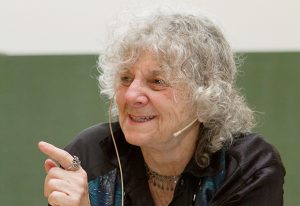
The day EMBL Hamburg predocs and postdocs invited Nobel Prize Winner Ada Yonath to dinner.
LAB MATTERS
24 November 2014
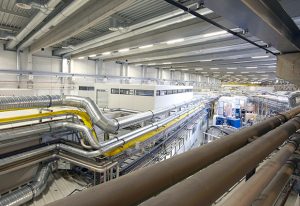
Life Science Nord event reveals how pharmaceutical companies use synchrotrons for their research.
SCIENCE & TECHNOLOGY
2014
eventsscience-technology
18 November 2014
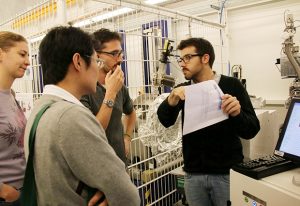
Course attendees go hunting (protein) aliens in a quest for optimal SAXS data.
SCIENCE & TECHNOLOGY
2014
eventsscience-technology
3 November 2014
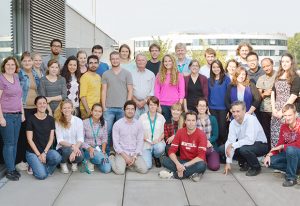
How to make good quality samples for good quality structural biology experiments.
SCIENCE & TECHNOLOGY
2014
eventsscience-technology
9 October 2014
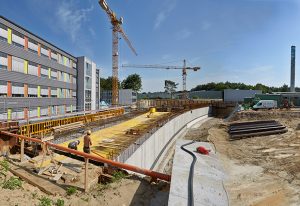
Pathfinding – poetic and practical – was a common theme in blogs from the EMBL network.
LAB MATTERS
16 September 2014
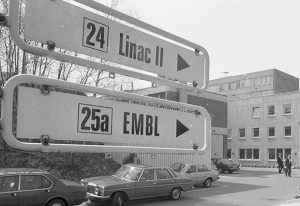
An interview with keynote speaker Michael Rossmann.
LAB MATTERS
2 September 2014
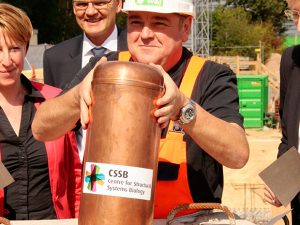
Research building for interdisciplinary Centre for Structural Systems Biology (CSSB) takes shape.
CONNECTIONS
8 August 2014
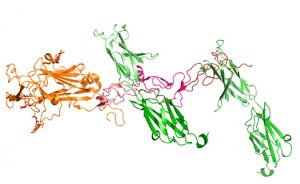
How a single molecule can attract and repel growing brain connections
SCIENCE & TECHNOLOGY
2014
sciencescience-technology
31 July 2014
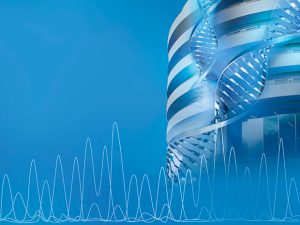
"Thank you, EMBL, for changing my life" – reunion celebrates great science and great scientists
LAB MATTERS
24 July 2014
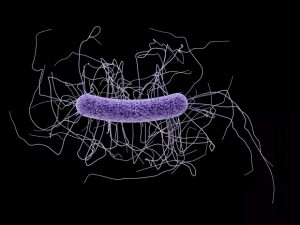
Molecular switch enables viruses to destroy C.diff bacteria – potential alternative to antibiotics
SCIENCE & TECHNOLOGY
2014
sciencescience-technology
1 July 2014

As the Lab turns 40, staff and alumni share 40 things that make EMBL, EMBL
LAB MATTERS
1 July 2014

As the Lab turns 40, staff and alumni share 40 things that make EMBL, EMBL
LAB MATTERS
1 July 2014

Scientists from EMBL's five sites reflect on the opportunities and challenges that might lie ahead
LAB MATTERS
14 February 2011
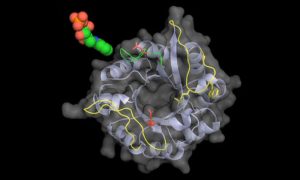
In a paper published online today in PNAS, scientists from the European Molecular Biology Laboratory (EMBL) in Hamburg, Germany, reveal new insights into the workings of enzymes from a group of bacteria including Mycobacterium tuberculosis, the bacterium that causes tuberculosis. The new findings…
SCIENCE & TECHNOLOGY
2011
sciencescience-technology
8 November 2010

At the Autumn 2010Council meeting of the EIROforum, a partnership of seven European intergovernmental research organisations with large research infrastructures, the Directors General unanimously accepted the European X-Ray Free-Electron Laser Facility (European XFEL), based in Hamburg, Germany, to…
LAB MATTERS
26 January 2010
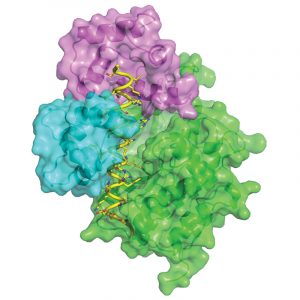
Cells rely on a range of signalling systems to communicate with each other and to control their own internal workings. Scientists from the European Molecular Biology Laboratory (EMBL) in Hamburg, Germany, have now found a way to hack into a vital communications system, raising the possibility of…
SCIENCE & TECHNOLOGY
2010
sciencescience-technology
1 February 2007
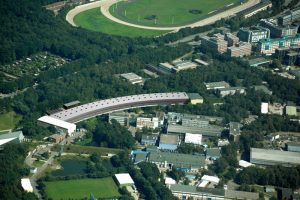
The German Federal Ministry for Education and Research (BMBF) has awarded 8.8 Million Euro to the Hamburg Outstation of the European Molecular Biology Laboratory (EMBL) for the construction of an Integrated Research Facility for Structural Biology at the new PETRA-III storage ring of the German…
LAB MATTERS
11 January 2006
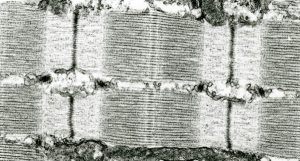
Imagine grabbing two snakes by the tail so that they can’t wriggle off in opposite directions. Scientists at the Hamburg Outstation of the European Molecular Biology Laboratory (EMBL) and collaborators from King’s College in London have now discovered that something similar happens to a…
SCIENCE & TECHNOLOGY
2006
sciencescience-technology
16 November 2005
Today the European Molecular Biology Laboratory (EMBL) opens a new highthroughput crystallization facility at its Outstation located on the campus of the German Synchrotron Radiation Facility (DESY) in Hamburg, Germany. The facility, made possible by major funds from the German Ministry for Science…
EMBL ANNOUNCEMENTSLAB MATTERS
2005
embl-announcementslab-matters
No results found



































































































































































